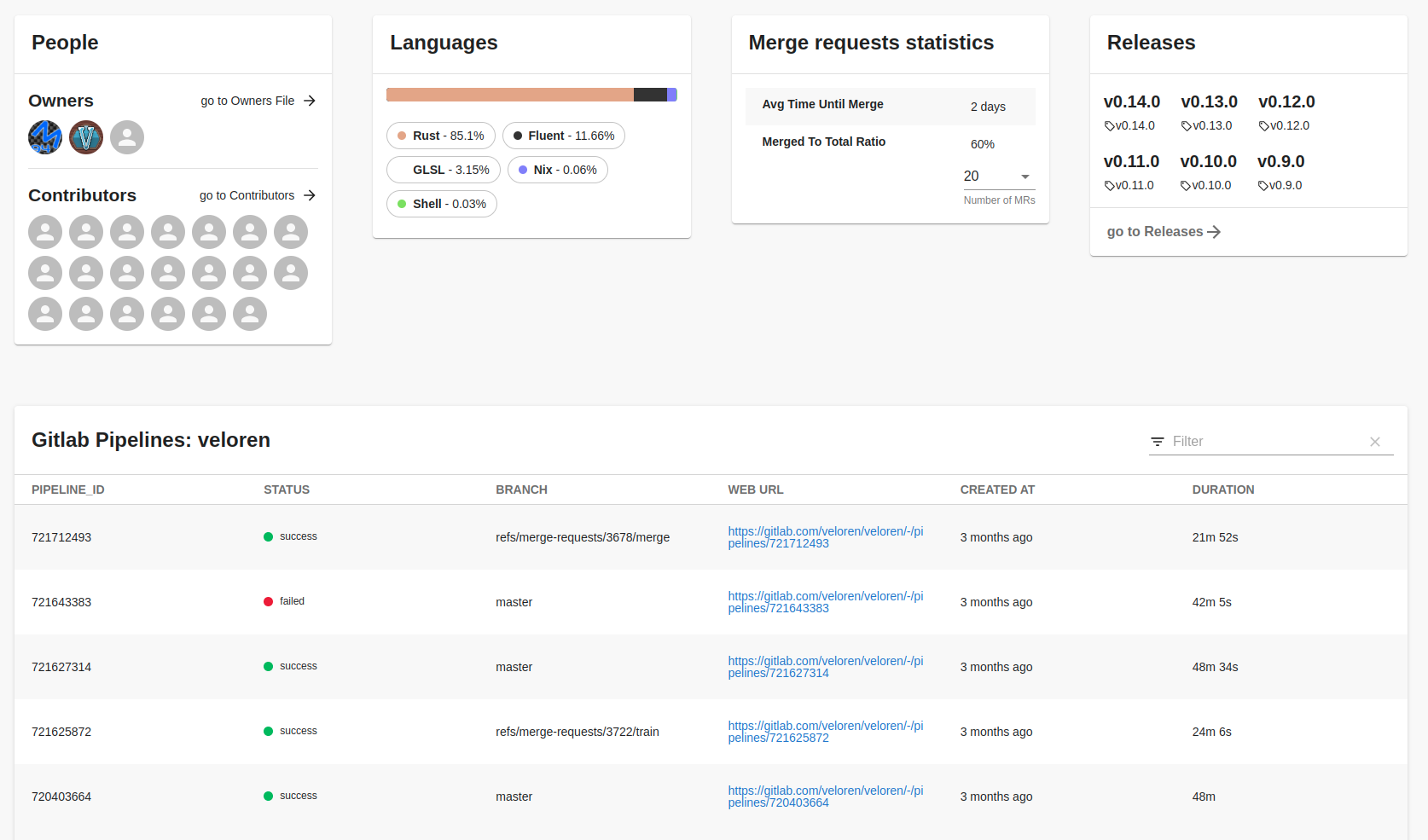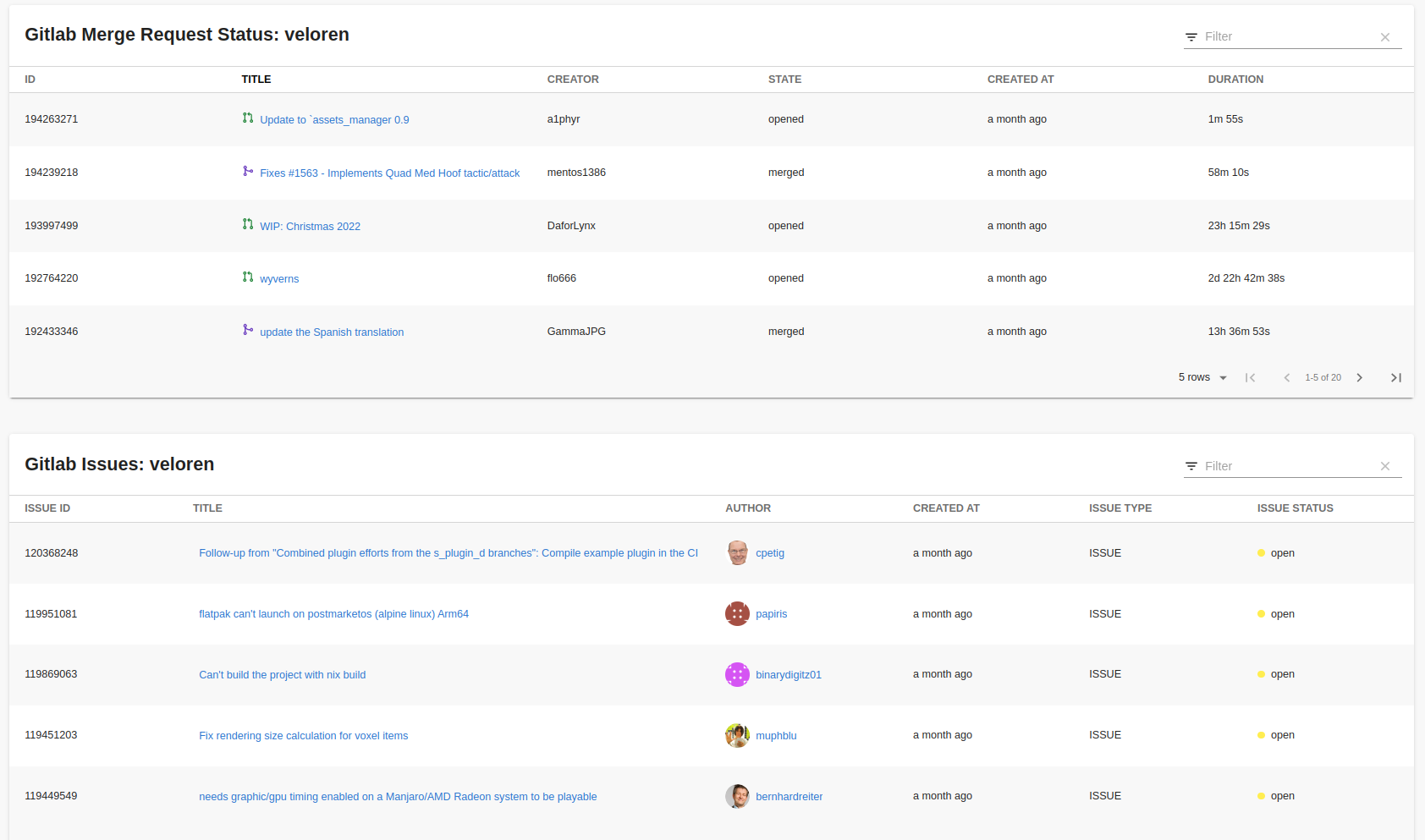- Features
- Screenshots
- Setup
- Annotations
- Old/New GitLab Versions
- Migration guides
- Support & Contribute
- License
- List top 20 builds for a project
- List top 20 Merge Requests for a project
- List top 20 Issues for a project
- List last releases
- View Code Owners for a project
- View Contributors for a project
- View Languages used for a project
- View Pipeline status for a project
- View README for a project
- Works for both project and personal tokens
- Pagination for builds
- Pagination for Merge Requests
- Merge Requests Statistics
- Support for Olds/New GitLab APIs version
- Support for multi GitLab Instance
- Install packages:
# From your Backstage root directory
yarn --cwd packages/app add @immobiliarelabs/backstage-plugin-gitlab
yarn --cwd packages/backend add @immobiliarelabs/backstage-plugin-gitlab-backend- Add a new GitLab tab to the entity page.
NOTE: By default the EntityGitlabContent does not load the README, see the Optional section.
packages/app/src/components/catalog/EntityPage.tsx
// packages/app/src/components/catalog/EntityPage.tsx
import {
isGitlabAvailable,
EntityGitlabContent,
} from '@immobiliarelabs/backstage-plugin-gitlab';
// Farther down at the serviceEntityPage declaration
const serviceEntityPage = (
<EntityLayout>
{/* Place the following section where you want the tab to appear */}
<EntityLayout.Route
if={isGitlabAvailable}
path="/gitlab"
title="Gitlab"
>
<EntityGitlabContent />
</EntityLayout.Route>
</EntityLayout>
);- (Optional) Add the GitLab cards to the Overview tab on the entity page.
packages/app/src/components/catalog/EntityPage.tsx
// packages/app/src/components/catalog/EntityPage.tsx
import {
isGitlabAvailable,
EntityGitlabContent,
EntityGitlabLanguageCard,
EntityGitlabMergeRequestsTable,
EntityGitlabMergeRequestStatsCard,
EntityGitlabPeopleCard,
EntityGitlabPipelinesTable,
EntityGitlabReadmeCard,
} from '@immobiliarelabs/backstage-plugin-gitlab';
//Farther down at the overviewContent declaration
//You can add only selected widgets or all of them.
const overviewContent = (
<Grid container spacing={3} alignItems="stretch">
<EntitySwitch>
<EntitySwitch.Case if={isGitlabAvailable}>
<Grid item md={12}>
<EntityGitlabReadmeCard />
</Grid>
<Grid item sm={12} md={3} lg={3}>
<EntityGitlabPeopleCard />
</Grid>
<Grid item sm={12} md={3} lg={3}>
<EntityGitlabLanguageCard />
</Grid>
<Grid item sm={12} md={3} lg={3}>
<EntityGitlabMergeRequestStatsCard />
</Grid>
<Grid item sm={12} md={3} lg={3}>
<EntityGitlabReleasesCard />
</Grid>
<Grid item md={12}>
<EntityGitlabPipelinesTable />
</Grid>
<Grid item md={12}>
<EntityGitlabMergeRequestsTable />
</Grid>
</EntitySwitch.Case>
</EntitySwitch>
</Grid>
);- Add the integration:
app-config.yamladd the integration for gitlab:
integrations:
gitlab:
- host: gitlab.com
token: ${GITLAB_TOKEN}Note: You can have more than one GitLab instance.
- Add the GitLab Filler Processor, this allows auto-filling of the annotations like the project id and slug:
packages/backend/src/plugins/catalog.ts
// packages/backend/src/plugins/catalog.ts
import { GitlabFillerProcessor } from '@immobiliarelabs/backstage-plugin-gitlab-backend';
export default async function createPlugin(
env: PluginEnvironment
): Promise<Router> {
const builder = await CatalogBuilder.create(env);
//...
// Add this line
builder.addProcessor(new GitlabFillerProcessor(env.config));
//...
const { processingEngine, router } = await builder.build();
await processingEngine.start();
return router;
}This allows auto-filling of the annotations.
- Add the
gitlabroute by creating the filepackages/backend/src/plugins/gitlab.ts:
packages/backend/src/plugins/gitlab.ts
// packages/backend/src/plugins/gitlab.ts
import { PluginEnvironment } from '../types';
import { Router } from 'express-serve-static-core';
import { createRouter } from '@immobiliarelabs/backstage-plugin-gitlab-backend';
export default async function createPlugin(
env: PluginEnvironment
): Promise<Router> {
return createRouter({
logger: env.logger,
config: env.config,
});
}then you have to add the route as follows:
packages/backend/src/index.ts
// packages/backend/src/index.ts
import gitlab from './plugins/gitlab';
async function main() {
//...
const gitlabEnv = useHotMemoize(module, () => createEnv('gitlab'));
//...
apiRouter.use('/gitlab', await gitlab(gitlabEnv));
//...
}- (Optional): You can also add plugin configurations in
app-config.yamlfile:
app-config.yaml
# app-config.yaml
# ...
gitlab:
# Default path for CODEOWNERS file
# Default: CODEOWNERS
defaultCodeOwnersPath: .gitlab/CODEOWNERS
# Default path for README file
# Default: README.md
defaultReadmePath: .gitlab/README.md
# Entity Kinds to witch the plugin works, if you want to render gitlab
# information for one Kind you have to add it in this list.
# Default: ['Component']
allowedKinds: ['Component', 'Resource']
# This parameter controls SSL Certs verification
# Default: true
proxySecure: falseBy default, the plugin automatically shows the project info corresponding to the location of the catalog.yaml file. But you could need some time to force another project, you can do it with the annotations gitlab.com/project-id or gitlab.com/project-slug:
# Example catalog-info.yaml entity definition file
apiVersion: backstage.io/v1alpha1
kind: Component
metadata:
# ...
annotations:
gitlab.com/project-id: 'project-id' #1234. This must be in quotes and can be found under Settings --> General
# or
gitlab.com/project-slug: 'project-slug' # group_name/project_name
spec:
type: service
# ...The plugins support also the gitlab.com/codeowners-path annotation:
# Example catalog-info.yaml entity definition file
apiVersion: backstage.io/v1alpha1
kind: Component
metadata:
# ...
annotations:
# You can change the CODEOWNERS path
# if it is not passed default specified in `app-config.yaml` is used
gitlab.com/codeowners-path: 'somewhere/CODEOWNERS'
spec:
type: service
# ...If you have an old GitLab version, or a new one, we allow you to extend the GitLab Client as follows:
packages/app/src/api.ts
import { GitlabCIApiRef } from '@immobiliarelabs/backstage-plugin-gitlab';
import { CustomGitlabCIClient } from '@immobiliarelabs/backstage-plugin-gitlab';
import { discoveryApiRef, configApiRef } from '@backstage/core-plugin-api';
import { CustomGitlabCIClient } from 'packages/app/src/myCustomClient.ts';
export const apis: AnyApiFactory[] = [
createApiFactory({
api: GitlabCIApiRef,
deps: { configApi: configApiRef, discoveryApi: discoveryApiRef },
factory: ({ configApi, discoveryApi }) =>
CustomGitlabCIClient.setupAPI({
discoveryApi,
codeOwnersPath: configApi.getOptionalString(
'gitlab.defaultCodeOwnersPath'
),
readmePath: configApi.getOptionalString(
'gitlab.defaultReadmePath'
),
}),
}),
];packages/app/src/myCustomClient.ts
import { GitlabCIClient } from '@immobiliarelabs/backstage-plugin-gitlab';
export class CustomGitlabCIClient extends GitlabCIClient {
// Override methods
async getPipelineSummary(projectID: string | undefined): Promise<PipelineSummary | undefined> {
this.callApi(...)
.
.
.
}
}see here.
If you have an old gitlab-plugin version, you can consult the migration guide.
Made with ❤️ by ImmobiliareLabs & Contributors
We'd love for you to contribute to Backstage GitLab Plugin! Here some tips on how to contribute. If you have any questions on how to use Backstage GitLab Plugin, bugs and enhancement please feel free to reach out by opening a GitHub Issue.
This plugin is based on the original work of loblaw-sre/backstage-plugin-gitlab by @satrox28 and @Balasundaram.
This plugin is under Apache 2.0 license, see NOTICE for copyright.





